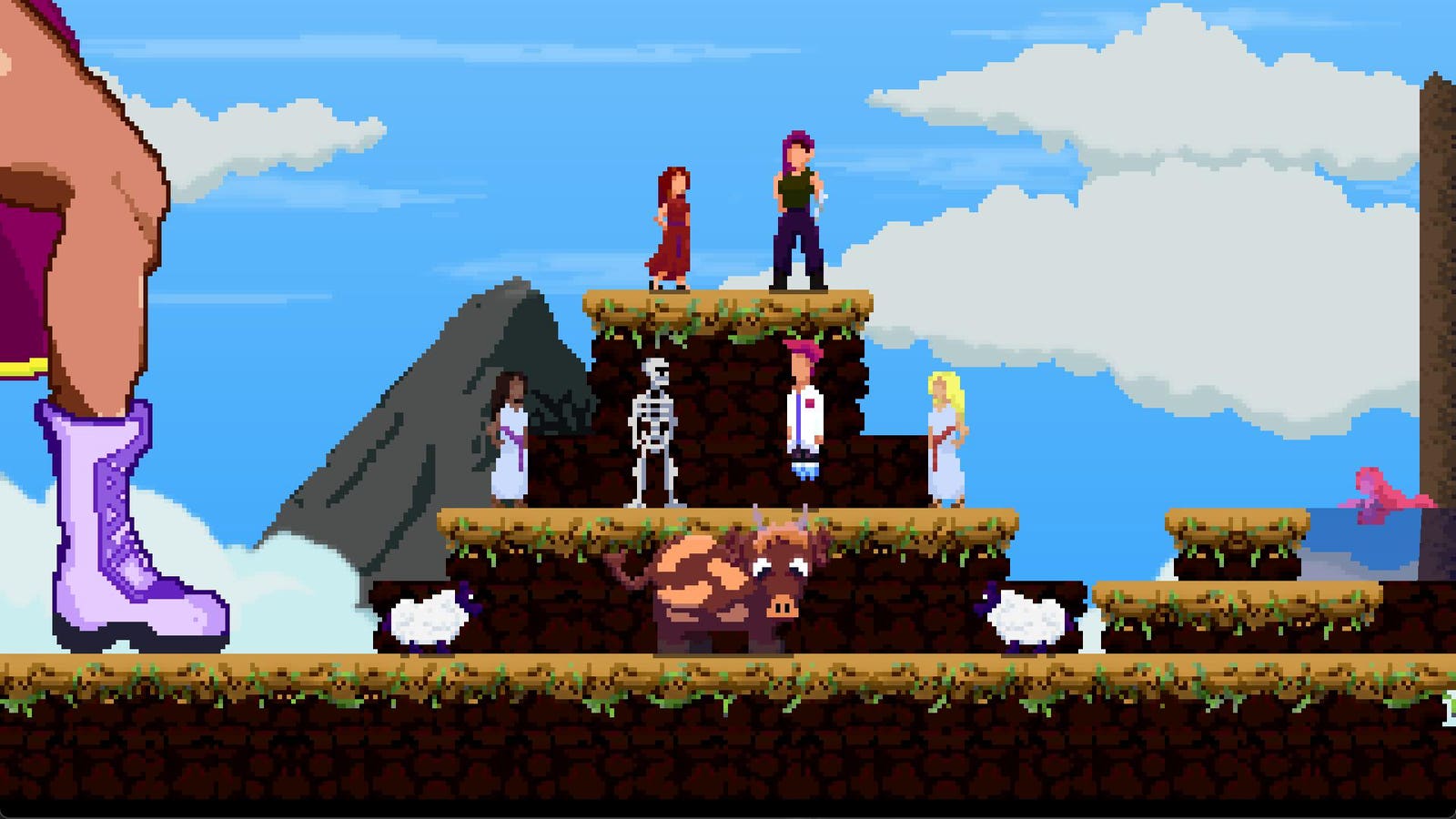NikkiJay doesn’t want you to know her real name. She doesn’t want you to see her face. On social media, she appears only as a pixelated version of herself. Anonymity isn’t an easy choice for her, it’s the only choice. She’s scared that if she reveals too much information about herself, someone will find her.
“I’d call the police if certain family members knocked on my door” she says. “I’m trying to avoid the chaos it’d bring for the sake of my daughter.” It’s not the typical conundrum a video games developer faces.
To this day, Jay only speaks with one person in her family. The rest will have nothing to do with her. It all stems from her upbringing. She grew up in the north east of England in the eighties as a member of a religious group she describes as a “cult”. Her experiences as a child have formed the basis for the characters and story in her upcoming adventure game, Quantum Witch.
Both her mother and father’s family have been involved in this particular religious circle (which Jay doesn’t want to name) for two generations and so it was inevitable she would be too. It meant she couldn’t have friends and was expected to dogmatically preach her beliefs to anyone she met.
NikkiJay appears only in pixelated format online
Play Puzzles & Games on Forbes
“I’d have to reject invites to Christmas and birthday parties before explaining my beliefs to other kids” Jay says. She’s talking with me over Zoom from her home. Sitting in a dark room with a green sheet draped across the window behind her, Jay recalls being spat on at school by a group of girls. “People would call me a ‘religious freak’ and a ‘weirdo’” she explains.
She found herself isolated socially. After school, Jay would be expected to study in preparation for religious meetings that were held multiple times a week. These gatherings were in a building she describes as a corporate meeting hall without windows. “It was the most soulless, life sucking experience imaginable” Jay adds.
Beginning with a prayer, meetings would last for two hours. The group’s male leaders recited sermons from a stage about how everyone in the world is being misled, while a crowd watched on. Jay says they were deliberately delivered in a monotone voice to keep people “dazed” and to prevent any critical thinking. “The routine was so monotonous, you’d just go into zombie mode. ‘Brainwashing’ is a strong term, but here it’s warranted” she says.
These sermons filled Jay’s head with traumatic ideas. “[They’d say] God is going to come and kill you if you don’t do everything he says” she remembers. Members of the group were also forbidden from receiving certain medical procedures (again, she doesn’t want to elaborate through fear of reprisal).
“If you needed an operation, you’d have to be prepared to just die” Jay says, adding that a friend passed away as a result of this ideology, believing that God would resurrect her. Despite the sore topic, Jay tries to remain upbeat throughout the conversation. She says that inappropriate humour is her coping mechanism.
A Sinclair ZX Spectrum computer (Photo by Peter Macdiarmid/Getty Images)
During this period of her life, Jay used video games as a form of escapism. At the age of eight she begged her parents for a ZX Spectrum and they eventually obliged. She then spent the summer holidays reading through the system’s manual and learning how to programme her own text-based adventure games. “As soon as I found I could escape into these worlds inside computers, I knew it’d be my life’s special interest” she adds.
But things were made worse for Jay at the age of 17 when she realised she was gay, something that was strictly prohibited in the religion’s ideals. She recalls one preacher saying that it would be great when “all the lesbians are dead” in a sermon. Terrified, she didn’t reveal her sexuality until she was 19. It proved to be a dramatic turning point in her life.
It led to an argument with her family. Devastated, she was forced to flee her home and was exiled from the “cult”. With no money, Jay became homeless. She recalls being forced to use a hacksaw just to open a tin of tuna, the only edible item she possessed. “You’re taught [by the religion] not to invest in the outside world so when you’re forced into this position, you have no idea where you’re going or how to eat” she says.
No-one in her family would answer the phone to her. Eventually Jay understood that she would need to build a life of her own. A Saturday job at a video games store popped up and she began making friends for the first time. It led to couch surfing before a job in web development and her own apartment came along.
Quantum Witch is about making your own choices
“That’s a strong theme in Quantum Witch” explains Jay. “Towards the end it becomes an issue of choice and agency, taking control of your own actions and not being led by the whim of others” she adds.
Quantum Witch is a 2D pixelated adventure game set in the realm of Hus. Players take on the role of Ren as she discovers something is awry in her idyllic life. There’s fetch quests and narrative decisions to make inspired by the ZX Spectrum’s Dizzy series (1987) and LucasArts games such as Day of the Tentacle (1993).
The game started out as a novel but Jay found writing a book to be too difficult. “I turned a few of my experiences into metaphors and short stories, but I couldn’t string them together into something cohesive with a through line and a strong narrative” she says.
Although Jay has developed Quantum Witch alone, she received narrative input from Bafta award winning writer, Paul Rose and journalist, Stephanie Sterling – both are credited as writers on the game’s end credits. Other inspirations include the comedy TV show Red Dwarf, the works of author Douglas Adams (The Hitchiker’s Guide to the Galaxy) and fourth-wall breaking films such as Deadpool (2016). “I wanted to do something that was retro looking but also cartoonish that could go from happy and jolly to quite dark quickly” Jay explains.
She now lives with her wife, daughter and cat and says she has been able to separate herself from the oppressive way of living she grew up with, although she concedes it took her decades to do so. Some of the memories she conjured while making Quantum Witch are still difficult to remember, however she now has a fresh perspective on her past.
“Instead of looking at [my past] and playing it out as a tragedy, I wanted it to be an absurdist comedy. I took that cult background and created characters from it that just amplified the ridiculousness of it. It really helped me. If you can laugh at something, it takes away it’s power” she says.
Quantum Witch is available on PC from June 24









